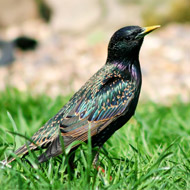Stylish nest boxes pose wildlife threat

“People tend to forget that a nest box will eventually contain tiny helpless, vulnerable baby birds so the appearance of the box should be the last thing on your mind”.
The RSPB is advising that quirky or unusual nest boxes, while attractive, could actually be dangerous for nesting birds.
Approaching springtime months and the BTO’s National Nest Box week may prompt people to purchase nest boxes for their gardens. The RSPB is advocating sticking to traditional, simple, wooden nest boxes.
Poorly insulated ceramic designs and nest boxes with metal roofing can have fatal consequences. Metal and plastic nest boxes create a damp and cold environment for baby bords. Brightly coloured features are unsuitably conspicuous, attracting predators to the nest.
Ben Andrew, RSPB wildlife advisor, said: “People tend to forget that a nest box will eventually contain tiny helpless, vulnerable baby birds so the appearance of the box should be the last thing on your mind”.
With recent evidence from the BTO documenting an alarming decline in garden birds, such as the house sparrow, the RSPB is offering advice on suitable nest boxes.
Carl Barimore, nest records organiser at the BTO, said: “Now in its 19th year, National Nest Box Week is about providing suitable nest sites for birds in our gardens and green spaces.
“Looking after nesting birds also means collecting data on how well they are doing, so we encourage people to monitor their boxes and tell the BTO what they see”.
The RSPB’s list of nest box do’s and don’ts, along with advice on constructing a nest box can be found at www.rspb.org.uk/makeahomeforwildlife



 The BSAVA has opened submissions for the BSAVA Clinical Research Abstracts 2026.
The BSAVA has opened submissions for the BSAVA Clinical Research Abstracts 2026.